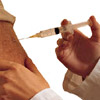Whooping cough outbreak highlights importance of vaccination
The recent resurgence of whooping cough cases in Australia has heightened the importance of vaccination and isolating people who are infected, according to Dr Philip Britton and Professor Cheryl Jones of the Children’s Hospital at Westmead and the Sydney Emerging Infectious Diseases and Biosecurity Institute.
Writing in June’s Australian Prescriber, Dr Britton and Professor Jones say older children and adults do not always show classical symptoms of the disease however are often a source of infection for young infants, for whom whooping cough can be very dangerous.
“Death from pertussis (whooping cough) is rare overall – but is close to 1% in infants under six months. Complications can include hospitalisation, bacterial infection, failure to thrive, cerebral hypoxia and encephalopathy in infants. Sleep disturbance, rib fracture and prolonged cough can also occur in adults,” write the authors.
Vaccination, isolation of primary cases and antibiotic treatment are important strategies to prevent the transmission of whooping cough. While the current national immunisation schedule recommends vaccinating infants at two, four and six months of age with booster doses at four and 15-17 years, waning immunity has been seen in older children and adults with this schedule.
“For this reason, booster vaccination is now recommended for groups who have a high risk of being in contact with people in at-risk groups, including adults planning a pregnancy, adult family members of newborns, and child and healthcare workers.”
While there is limited evidence regarding the effectiveness of antibiotics as a precautionary measure to prevent the spread of whooping cough, it is still recommended for people who have been exposed to whooping cough and who have a high risk of passing it on to someone most at risk.
“These include people in households where there are newborns or other children less than two years who have received less than three doses of vaccine, healthcare workers in maternity and neonatal units and infants in these units where a healthcare worker was the infected case.”
NPS clinical adviser Dr Philippa Binns says given that antibiotics are so important in treating and preventing the spread of whooping cough, it’s important all Australians take action to prevent the development and spread of antibiotic resistance.
“Antibiotics are important weapons in the fight against bacterial infections like whooping cough, so we need to make sure we keep them for when people really need them. This means not taking them for viral infections such as a cold or flu, because these cannot be treated with antibiotics,” says Dr Binns.
(Source: NPS)
More Information
 | For more information on immunisation, including the childhood immunisation scedule, types of vaccines, preconception screening, as well as some useful videos, see Immunisation. |
Dates
Tags
Created by:

 Login
Login














